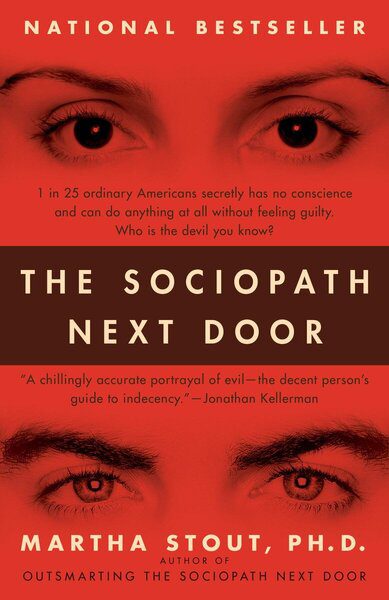There are more sociopaths among us than people who suffer from the much-publicized disorder of anorexia, four times as many sociopaths as schizophrenics, and one hundred times as many sociopaths as people diagnosed with a known scourge such as colon cancer.
We are accustomed to think of sociopaths as violent criminals, but in The Sociopath Next Door, Harvard psychologist Martha Stout reveals that a shocking 4 percent of ordinary people—one in twenty-five—has an often undetected mental disorder, the chief symptom of which is that that person possesses no conscience. He or she has no ability whatsoever to feel shame, guilt, or remorse. One in twenty-five everyday Americans, therefore, is secretly a sociopath. They could be your colleague, your neighbor, even family. And they can do literally anything at all and feel absolutely no guilt.
“4 percent of the general population has antisocial personality disorder (ASPD, sociopathy, or psychopathy).”
About one in twenty-five individuals are sociopathic, meaning, essentially, that they do not have a conscience. It is not that this group fails to grasp the difference between good and bad; it is that the distinction fails to limit their behavior. The intellectual difference between right and wrong does not bring on the emotional sirens and flashing blue lights, or the fear of God, that it does for the rest of us. Without the slightest blip of guilt or remorse, one in twenty-five people can do anything at all.
Martha Stout on sociopath:
“As a psychologist and as a person, I have seen far too many lives nearly obliterated by the choices and acts of a conscienceless few. These few are both dangerous and remarkably difficult to identify. Even when they are not physically violent—and especially when they are familiar and close to us—they are all too capable of mangling individual lives, and of making human society as a whole an unsafe place to be. ”
“As individuals, people of conscience can learn to recognize “the sociopath next door,” and with that knowledge work to defeat his entirely self-interested aims. At the very least, they can protect themselves and their loved ones from his shameless maneuverings.”
antisocial personality disorder
Condition of little or no conscience as “antisocial personality disorder,” a non-correctable disfigurement of character that is now thought to be present in about 4 percent of the population—that is to say, one in twenty-five people. This condition of missing conscience is called by other names, too, most often “sociopathy,” or the somewhat more familiar term, psychopathy.
Guiltlessness was in fact the first personality disorder to be recognized by psychiatry, and terms that have been used at times over the past century include manie sans délire, psychopathic inferiority, moral insanity, and moral imbecility.
DSM Definition
“According to the current bible of psychiatric labels, the Diagnostic and Statistical Manual of Mental Disorders IV of the American Psychiatric Association, the clinical diagnosis of “antisocial personality disorder” should be considered when an individual possesses at least three of the following seven characteristics:”
(1) failure to conform to social norms;
(2) deceitfulness, manipulativeness;
(3) impulsivity, failure to plan ahead;
(4) irritability, aggressiveness;
(5) reckless disregard for the safety of self or others;
(6) consistent irresponsibility;
(7) lack of remorse after having hurt, mistreated, or stolen from another person.
The presence in an individual of any three of these “symptoms,” taken together, is enough to make many psychiatrists suspect the disorder.
People without conscience experience emotions very differently from you and me, and they do not experience love at all, or any other kind of positive attachment to their fellow human beings. This deficit, which is hard even to ponder, reduces life to an endless game of attempted domination over other people.
The Sociopath
A sociopath is someone who “fails to conform to social norms,” or who is “never monogamous,” or who “fails to honor financial obligations,” for the straightforward reason that an obligation of any kind is something one feels toward beings, or toward a group of beings, who matter emotionally. And to a sociopath, we simply do not matter.
Sociopathy is, at its very essence, ice-cold, like a dispassionate game of chess. In this way, it is different from ordinary duplicitousness, narcissism, and even violence, which are often full of emotional heat. If necessary, most of us would lie to save the life of someone in our family, and it is something of a cliché to point out that a violent gang member (as opposed, perhaps, to his sociopathic leader) may conceivably feel loyalty and warmth toward the members of his gang, and tenderness for his mother and siblings.
“The only emotions that sociopaths seem to feel genuinely are the so-called “primitive” affective reactions that result from immediate physical pain and pleasure, or from short-term frustrations and successes. ”
sociopathic charisma
One of the more frequently observed of these traits is a glib and superficial charm that allows the true sociopath to seduce other people, figuratively or literally—a kind of glow or charisma that, initially, can make the sociopath seem more charming or more interesting than most of the normal people around him. He or she is more spontaneous, or more intense, or somehow more “complex,” or sexier, or more entertaining than everyone else. Sometimes this “sociopathic charisma” is accompanied by a grandiose sense of self-worth that may be compelling at first, but upon closer inspection may seem odd or perhaps laughable. (“Someday the world will realize how special I am,” or “You know that after me, no other lover will do.”)
Virtue is not the absence of vices or the avoidance of moral dangers; virtue is a vivid and separate thing, like pain or a particular smell. –G. K. Chesterton
seventh sense—conscience
For something like 96 percent of us, conscience is so fundamental that we seldom even think about it. For the most part, it acts like a reflex. Unless temptation is extremely great (which, thankfully, on a day-to-day basis it usually is not), we by no means reflect on each and every moral question that comes our way.
“Conscience is our omniscient taskmaster, setting the rules for our actions and meting out emotional punishments when we break the rules. We never asked for conscience. It is just there, all the time, like skin or lungs or heart. In a manner of speaking, we cannot even take credit. And we cannot imagine what we would feel like without it.”
Psychologically speaking, conscience is a sense of obligation ultimately based in an emotional attachment to another living creature (often but not always a human being), or to a group of human beings, or even in some cases to humanity as a whole. Conscience does not exist without an emotional bond to someone or something, and in this way conscience is closely allied with the spectrum of emotions we call “love.” This alliance is what gives true conscience its resilience and its astonishing authority over those who have it, and probably also its confusing and frustrating quality.
“Conscience is something that we feel. In other words, conscience is neither behavioral nor cognitive. Conscience exists primarily in the realm of “affect,” better known as emotion.”
If anything, people without conscience tend to believe their way of being in the world is superior to ours. They often speak of the naïveté of other people and their ridiculous scruples, or of their curiosity about why so many people are unwilling to manipulate others, even in the service of their most important ambitions. Or they theorize that all people are the same—unscrupulous, like them—but are dishonestly playacting something mythical called “conscience”.
Guiltlessness
Guiltlessness is uniquely confusing as a medical concept, too. Quite unlike cancer, anorexia, schizophrenia, depression, or even the other “character disorders,” such as narcissism, sociopathy would seem to have a moral aspect. Sociopaths are almost invariably seen as bad or diabolical, even by (or perhaps especially by) mental health professionals, and the sentiment that these patients are somehow morally offensive and scary comes across vividly in the literature.
Psychopathy Checklist
Robert Hare, a professor of psychology at the University of British Columbia, has developed an inventory called the Psychopathy Checklist, now accepted as a standard diagnostic instrument for researchers and clinicians worldwide. Of his subjects, Hare, the dispassionate scientist, writes, “Everyone, including the experts, can be taken in, manipulated, conned, and left bewildered by them. A good psychopath can play a concerto on anyone’s heartstrings. . . . Your best defense is to understand the nature of these human predators.
Sociopathy
Sociopathy stands alone as a “disease” that causes no dis-ease for the person who has it, no subjective discomfort. Sociopaths are often quite satisfied with themselves and with their lives, and perhaps for this very reason there is no effective “treatment.” Typically, sociopaths enter therapy only when they have been court-referred, or when there is some secondary gain to be had from being a patient. Wanting to get better is seldom the true issue. All of this begs the question of whether the absence of conscience is a psychiatric disorder or a legal designation—or something else altogether.
“Sociopathy is more than just the absence of conscience, which alone would be tragic enough. Sociopathy is the inability to process emotional experience, including love and caring, except when such experience can be calculated as a coldly intellectual task.”
The Tools of the Trade
The first such technique is charm, and as a social force, charm should not be underestimated.
When a sociopath identifies someone as a good game piece, she studies that person. She makes it her business to know how that person can be manipulated and used, and, to this end, just how her chosen pawn can be flattered and charmed. In addition, she knows how to promote a sense of familiarity or intimacy by claiming that she and her victim are similar in some way. Victims often recall statements that affected them even after the sociopath was gone, such as, “You know, I think you and I are a lot alike,” or “It’s so clear to me that you’re my soul mate.” In retrospect, these remarks can feel supremely demeaning. Outrageously untrue, they haunt the mind nonetheless.
Seduction
Relatedly, people without conscience have an uncanny sense of who will be vulnerable to a sexual overture, and seduction is another very common sociopathic technique. For most people, a sexual liaison involves an emotional tie, even if only fleetingly, and such ties are used by the coldly remorseless to get what they want—allegiance, financial support, information, a sense of “winning,” or perhaps just a temporary relationship that has the appearance of being normal.
A sociopath who is hiding out in an organization can have his or her tracks hidden indefinitely by just one or two normal individuals who have made the single mistake of consummating their attraction to this charmingly dangerous person.
Acting
We are seduced as well by the acting skills of the sociopath. Since the scaffolding of a life without conscience is deception and illusion, intelligent sociopaths often become proficient at acting, and even at some of the particular techniques employed by professional actors. Paradoxically, the visible signs of emotion at will can become second nature to the cold-blooded—the appearance of intense interest in another person’s problems or enthusiasms, chest-thumping patriotism, righteous indignation, blushing modesty, weepy sadness.
Crocodile tears
“Crocodile tears at will are a sociopathic trademark”
Crocodile tears from the remorseless are especially likely when a conscience-bound person gets a little too close to confronting a sociopath with the truth. A sociopath who is about to be cornered by another person will turn suddenly into a piteous weeping figure whom no one, in good conscience, could continue to pressure. Or the opposite: Sometimes a cornered sociopath will adopt a posture of righteous indignation and anger in an attempt to scare off her accuser.
Roles
Being natural actors, conscienceless people can make full use of social and professional roles, which constitute excellent ready-made masks that other people are loath to look behind. Roles help us organize our complex society, and they are tremendously important to us.
book-by-its-cover strategy
We try, consciously or tacitly, to judge a person’s character by his or her appearance, but this book-by-its-cover strategy is ineffective in nearly all cases. In the real world, the bad guys do not look the way they are supposed to. They do not resemble werewolves or Hannibal Lechter or Tony Perkins staring at a corpse in a rocking chair. On the contrary, they look like us.
Shadow theory
Shadow theory—the simple and probably accurate notion that we all have a “shadow side” not necessarily apparent from our usual behavior—maintains in its most extreme form that anything doable or feelable by one human being is potentially doable or feelable by all. In other words, under certain circumstances (though they are circumstances we are hard-pressed to imagine) anyone at all could be, for example, a death-camp commandant. Ironically, good and kindhearted people are often the most willing to subscribe to this theory in the radical form that proposes they could, in some bizarre situation, be mass murderers.
Sympathy and Pity
Pity and sympathy are forces for good when they are reactions to deserving people who have fallen on misfortune. But when these sentiments are wrested out of us by the undeserving, by people whose behavior is consistently antisocial, this is a sure sign that something is wrong, a potentially useful danger signal that we often overlook. Perhaps the most easily recognized example is the battered wife whose sociopathic husband beats her routinely and then sits at the kitchen table, head in his hands, moaning that he cannot control himself and that he is a poor wretch whom she must find it in her heart to forgive.
“Sociopaths sometimes exhibit brief, intense enthusiasms—hobbies, projects, involvements with people—that are without commitment or follow-up. These interests appear to begin abruptly and for no reason, and to end the same way.”
childhood abuse
The speculation about social factors that makes the most immediate, intuitive sense is childhood abuse. Perhaps some people with a genetic and neurological predisposition to sociopathy ultimately become sociopathic, while others do not, because the ones who become sociopaths are abused in childhood, and the abuse worsens their psychological status and possibly even their already compromised neurological functioning.
After all, we know as a certainty that childhood abuse has a large number of other negative outcomes, among them run-of-the-mill (nonsociopathic) juvenile delinquency and violence, adult depression, suicidality, dissociation and various divisions of consciousness, anorexia, chronic anxiety, and substance abuse. Psychological and sociological studies show us beyond the shadow of a doubt that childhood abuse is unrelentingly toxic to the psyche.
Thirteen Rules for Dealing with Sociopaths in Everyday Life
1. The first rule involves the bitter pill of accepting that some people literally have no conscience. These people do not often look like Charles Manson or a Ferengi bartender. They look like us.
2. In a contest between your instincts and what is implied by the role a person has taken on—educator, doctor, leader, animal lover, humanist, parent—go with your instincts.
3. When considering a new relationship of any kind, practice the Rule of Threes regarding the claims and promises a person makes, and the responsibilities he or she has. Make the Rule of Threes your personal policy.
4. Question authority.
5. Suspect flattery.
6. If necessary, redefine your concept of respect.
7. Do not join the game.
8. The best way to protect yourself from a sociopath is to avoid him, to refuse any kind of contact or communication.
9. Question your tendency to pity too easily.
10. Do not try to redeem the unredeemable.
12. Defend your psyche.
13. Living well is the best revenge.
All the Best in your quest to get Better. Don’t Settle: Live with Passion.



5 Comments
Pingback: Book Summary – Outsmarting the Sociopath Next Door: How to Protect Yourself Against a Ruthless Manipulator by Martha Stout Ph.D. – Lanre Dahunsi
Pingback: 100 Books Reading Challenge 2021 – Lanre Dahunsi
Pingback: On Gaslighting. – Lanre Dahunsi
Pingback: On Sociopathy. – Lanre Dahunsi
Pingback: Dr. Martha Stout on Sociopathy. – Lanre Dahunsi